Syria attack: Trump says US, UK and French forces strike
Russia’s military claims nearly three quarters of Coalition missiles missed their targets thanks to its help.
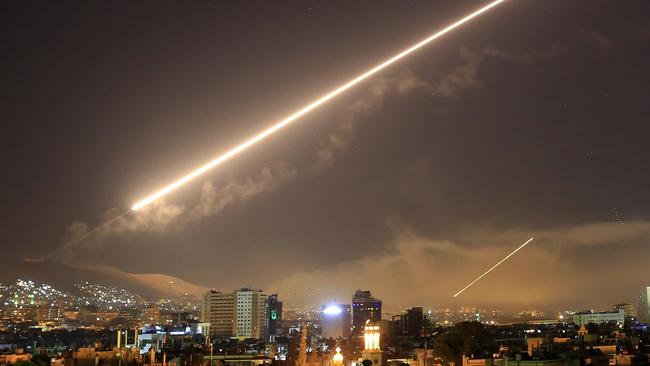
The US and allies Britain and France have launched air attacks, including missiles, on Syria in retaliation for the Assad government’s use of chemical weapons, amid a dramatic announcement by Donald Trump. Syria has responded with unspecified anti-aircraft defences and also a statement. The three allied nations are assessing the results of what the Pentagon says is a limited action. All times AEST
10pm: UN Security Council to meet
The UN Security Council will meet at 3pm GMT (midnight, AEST) to discuss the air strikes by the US, Britain and France on Syria.
Earlier, and angry Russian President Vladimir Putin called for an emergency gathering over the “devastating impact” the bombing.
Moscow is now considering supplying S-3000 missile systems to Syria.
“Russia convenes an emergency meeting of the UN Security Council to discuss aggressive actions of the US and its allies,” President Vladimir Putin said in a statement on Saturday published on the Kremlin website.
“The current escalation of the situation around Syria has a devastating impact on the whole system of international relations,” he added.
British Prime Minister earlier tonight said she was left with no choice but to act in response to a chemical attack on rebel-held Douma last weekend. She has refused to rule out further military action.
“We are also clear about who was responsible for this atrocity. A significant body of information including intelligence indicates the Syrian regime is responsible for this latest attack.
The Prime Minister @Theresa_May is holding a press conference on Syria. https://t.co/mwcHYPRfB5
— UK Prime Minister (@10DowningStreet) April 14, 2018
9.51pm: Weapons inspectors now enroute to Douma
Weapons inspectors will try to reach the site of a suspected poison attack in the Syrian town of Douma, hours after Western countries launched air strikes in retaliation over the gassing.
The OPCW’s fact-finding mission on Saturday “will continue its deployment to the Syrian Arab Republic to establish facts around the allegations of chemical weapons use in Douma”, the agency said in a statement.
The United States, Britain and France fired more than 100 missiles at Syria early on Saturday in the first co-ordinated Western military intervention against the Damascus government. They say the strikes are punishment for killing dozens of people, many of them women and children, with banned toxic munitions. Damascus and its ally Russia have denounced the Western action, in particular for refusing to wait until the results of the fact-finding mission sent by the OPCW in the wake of the April 7 incident.
Rescue workers said scores of people died in that incident. Washington says it has confirmed that chlorine gas was used, and has unconfirmed suspicion that nerve agents may also have been used. Damascus and Moscow deny blame for any such attack.
Security permitting, a team from the Organisation for the Prohibition of Chemical Weapons will deploy briefly on Saturday to the site. The team will work with the United Nations Department of Safety and Security to ensure the safety of the team, it said.
Syria agreed to give up its chemical weapons arsenal in 2013 and submit to OPCW inspections. It is meant to have destroyed all of its stockpiles of nerve agents. In the case of chlorine, it is permitted to possess it for civilian use, but not to use it as a weapon.
The OPCW will determine whether chemical weapons were used, but will not assign blame.
8pm: Just made us more determined: Assad
Syrian President Bashar al-Assad said Western strikes on government military installations Saturday only made him more keen to fight back against his opponents, in comments published by his office.
“This aggression will only make Syria and its people more determined to keep fighting and crushing terrorism in every inch of the country,” Assad, in his first reaction to the strikes, told his Iranian counterpart Hassan Rouhani.

7.30pm: Trump, Macron, May now on shaky legal ground
Britain, France and the US struck suspected Syrian chemical weapons facilities in retaliation for a “clear violation” of international law, but experts warned they were on dubious legal ground themselves in carrying out the unilateral action.
British Prime Minister Theresa May called the strikes “right and legal”, saying the international community would not tolerate the continued use of chemical weapons, while France says Syria has maintained a clandestine chemical arms programme since 2013 — when Damascus ostensibly signed on to the Chemical Weapons Convention.
In an analysis released Saturday, French intelligence services said “evidence collected” showed about 11 chemical attacks, mostly involving chlorine, since April 4, 2017, when sarin gas was used in Khan Sheikhoun.
But Moscow, Syria’s main backer in the seven-year civil war, immediately demanded an emergency meeting of the UN Security Council, saying the Western powers had violated “the UN charter and the norms and principles of international law”.
Analysts agreed that in striking Syria without UN authorisation — impossible given Russia’s repeated vetoes on the Security Council — the Coalition was relying instead on a nebulous concept of “legal morality”.
“The violation of conventions doesn’t give you the right to use force,” said Francoise Saulnier, legal director at the Doctors Without Borders aid group, which has a long history of intervening in humanitarian crises.
Under UN rules, military force against a foreign power is allowed under just three conditions: legitimate self-defence, at the request of the country where it would occur, or in case of a Security Council authorisation.
For Patrick Baudouin, a lawyer with the International Federation for Human Rights in Paris, “it’s breaking international law with the goal of ensuring it is respected.”
“It’s the idea that there is some sort of international humanitarian law based on a ‘responsibility to protect’. But this isn’t something laid down in international law.”
- AFP
6.54pm: Syria’s ‘excellent’ military stopped missiles
Russian President Vladimir Putin has denounced the raids as aggression that will make the humanitarian crisis in Syria worse and has called for an emergency meeting of the United Nations’ Security Council.
Putin added that the strike had a “destructive influence on the entire system of international relations.”
US Pentagon officials said the attacks targeted the heart of Assad’s programs to develop and produce chemical weapons. Syrian television reported that Syria’s air defenses, which are substantial, responded to the attack.
Russia’s defence ministry said Western strikes claimed no victims among Syrian civilians or military.
“According to preliminary information, there were no victims among peaceful civilians and the Syrian military,” senior military officer Sergei Rudskoi said at a briefing in Moscow.
The Russian military said that 103 cruise missiles were fired including Tomahawk missiles but that Syrian air defence systems managed to intercept 71 cruise missiles.
“All together, 103 cruise missiles were deployed,” senior military officer Sergei Rudskoi said at a briefing in Moscow. “71 cruise missiles were intercepted.” Rudskoi said Syria had Soviet-made defence systems that Moscow has “completely overhauled,” including S-200 systems and Buk missiles.
He called the lack of casualties the result of the “excellent skills of the Syrian military trained by our specialists.” Moscow could now revisit its decision not to supply Damascus with its more recent S-300 air defence system, Rudskoi said.
“Considering what has happened, we consider it possible to reassess this question and not just as far as concerns Syria, but other countries too,” Rudskoi said.
US Defense Secretary Jim Mattis said there were no reports of US losses in what he described as a heavy but carefully limited assault. President Donald Trump said the US is prepared to sustain economic, diplomatic and military pressure on Assad until he ends what the president called a criminal pattern of killing his own people with internationally banned chemical weapons. The allied attack set off a fierce international debate about whether it was justified.
On Saturday, Putin reaffirmed Russia’s view that a purported chemical attack in the Syrian town of Douma that prompted the strike was a fake. Putin added that Russian military experts who inspected Douma found no trace of the attack. He criticised the US and its allies for launching the strike without waiting for inspectors from the international chemical weapons watchdog to visit the area.
- AP
5.50pm: Missile strikes ‘highly successful’
British air strikes on a Syrian base on Saturday have been “highly successful” according to early indications and the crews of the four British fighter jets involved have returned safely, Defence Secretary Gavin Williamson said.
“Every early indication is that it has been a highly successful mission... Our service personnel have played an important role in terms of degrading the ability of the Syrian regime to use chemical weapons in future,” Williamson told BBC

- AFP
5.30pm: Iran slams ‘criminal’ Trump
Iran’s supreme leader Ayatollah Ali Khamenei has denounced US President Donald Trump, France’s Emmanuel Macron and Britain’s Theresa May after they launched strikes Saturday against the Syrian regime, branding them “criminals”.
“The attack this morning against Syria is a crime,” Khamenei said in remarks published on his Telegram channel. “The American president, the French president and the British prime minister are criminals.”
- AFP
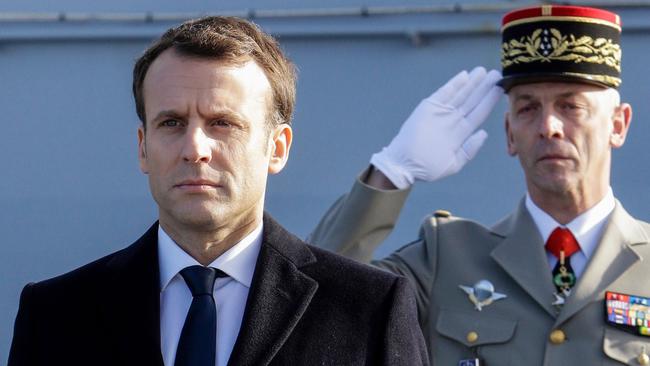
4.45pm: Bill Shorten backs Syria strikes
Labor leader Bill Shorten has issued a statement in support of the “appropriate and targeted response to the chemical weapons attack in Eastern Ghouta.”
“We note the military strikes in Syria are a joint action by the US, UK and France, designed to prevent more atrocities against civilians by targeting the facilities and infrastructure that enables the chemical weapons attack, and to send a clear signal such attacks cannot be tolerated,” the statement, jointly issued by Opposition foreign affairs spokeswoman Penny Wong and Opposition defence spokesman Richard Marles this afternoon.
“Labor has been briefed by the Government, and will be receiving a fuller briefing from our security agencies on this mission.
Condemning the “barbaric and criminal act”, Labor also took at aim at Russia’s veto of the UN Security Council resolution authorising a full investigation.
“It is tantamount to Russian support for such attacks. That is completely unacceptable, and has left few other options available for the international community to take action against Syria, and demonstrate its abhorrence of this latest attack.”
“Labor urges all parties involved in the continuing conflict in Syria, including Russia and Iran, to apply maximum pressure on the Syrian regime to bring an immediate end to the production and use of chemical weapons, and to bring an end to this conflict which has caused so much suffering for the Syrian people.”
4.35pm: Strikes ‘mean very little’
US President Donald Trump’s allied-backed missile strikes on Syria “means very little” and won’t deter dictators from further chemical weapons attacks, a University of Melbourne expert says.
Saturday’s strikes by the US, Britain and France have been designed to punish Syrian President Bashar Assad for a suspected chemical weapons attack that left 60 civilians dead in Douma a week ago.
But international relations expert Dr Denis Dragovic says the attack, similar to last year’s missile strikes, won’t stop the use of chemical weapons - unless the US follows with broader long term strategy for Syria.
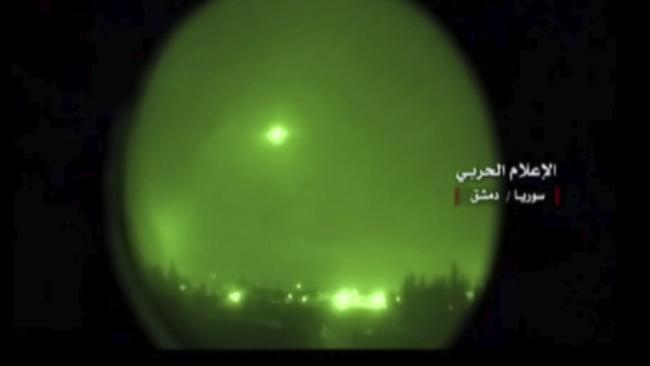
“It’s not going to topple Assad,” Dr Dragovic, honorary Senior Fellow at the University of Melbourne, told AAP.
“It’s not sending a message to tyrants and dictators around the world. “It’s not going to change something on the ground in Syria.” This will be viewed as a short-term intervention by the US and the West, but it does not signify a shift in strategy that will see an end to the war in Syria, Dr Dragovic said.
“For the people in Syria it’s a never-ending horror, regardless of what’s being used - they’re dying,” the former aid worker said.
“For the people in the West, it’s a new horror so we get shocked into action. This is a show of force.”
- AAP
4pm: Syrians react to bombardment
Hundreds of Syrians gathered at landmark squares in the Syrian capital Saturday, honking their car horns, flashing victory signs and waving Syrian flags in scenes of defiance that followed unprecedented joint airstrikes by the United States, France and Britain.
A few hours earlier, before sunrise, loud explosions jolted Damascus and the sky turned orange as Syrian air defense units fired surface-to-air missiles in response to three waves of military strikes meant to punish President Bashar Assad for his alleged use of chemical weapons.
Associated Press reporters saw smoke rising from east Damascus and what appeared to be a fire light up the sky. From a distance, US missiles hitting suburbs of the capital sounded like thunder. Shortly after the one-hour attack ended, vehicles with loudspeakers roamed the streets of Damascus blaring nationalist songs.
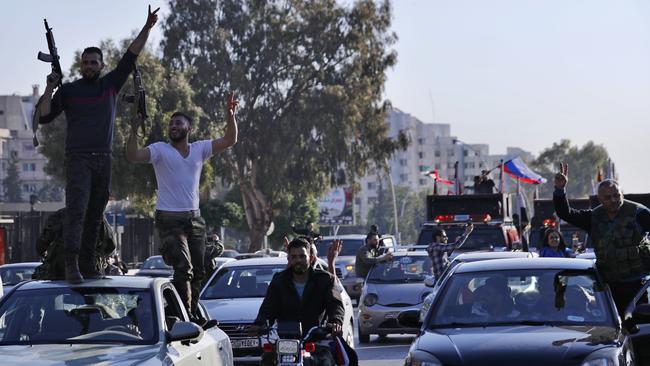
“Good souls will not be humiliated,” Syria’s presidency tweeted after the airstrikes began.
Immediately after the attack, hundreds of residents began gathering in the landmark Omayyad square of the Syrian capital. Many waved Syrian, Russian and Iranian flags. Some clapped their hands and danced, other drove in convoys, honking their horns in defiance.
“We are your men, Bashar,” they shouted.
Syrian state TV broadcast live from the square where a large crowd of civilians mixed with men in uniforms, including an actor, lawmakers and other figures. “Good morning steadfastness,” one broadcaster said.
-AFP
Primrose Riordan 3pm: Labor seeks briefing
Labor frontbencher Anthony Albanese has said the opposition expects to get a briefing from the government on Syria today.
“Labor has requested a briefing from the Prime Minister’s office. It is important that these national security issues not be the subject of partisan political debate,” he said.
“We have requested a briefing and that will be happening in coming hours and then Labor will make a comprehensive statement.”
He said the party was staunchly against the use of chemical weapons.
“We quite clearly, along with anyone who cares about human rights, abhor the use of chemical weapons. It has no place whatsoever.”
2.45pm: Australia played no part: minister
Australian forces played no part in the joint US, British and French strikes against the Assad regime in Syria, the government has confirmed.
Defence Minister Marise Payne spoke to US Secretary of Defence James Mattis today for a briefing on the three targets of the strike but assured reporters no request for support had been made.
“It has reduced the regime’s ability to use chemical weapons in the future and sends a clear and strong message that the use of chemical weapons will not be tolerated by the international community.” Ms Payne told reporters in Sydney.
1.55pm: US, allies launched more than 100 strikes
The US says it and its allies waged more than 100 strikes on Syria in a “one time shot” that the Pentagon says followed conclusive evidence that Syrian President Bashar al-Assad was responsible for a chemical weapons attack using at least chlorine gas.
US Defense Secretary Jim Mattis and Marine General Joseph Dunford, meanwhile, say three main chemical weapons facilities were targeted by both missiles from the sea and fired from aircraft, which triggered Syrian air defences.
The Pentagon could not confirm how many missiles hit their targets.
Mr Mattis and General Dunford acknowledge the strike was designed to degrade Syria’s chemical weapons capability without killing civilians or the many foreign fighters in Syria’s multi-sided civil war, particularly those from Russia.
“We specifically identified these targets to mitigate the risk of Russian forces being involved,” General Dunford tells reporters, adding the US military advised Russia of airspace that would be used in the strike but did not “pre-notify them”.
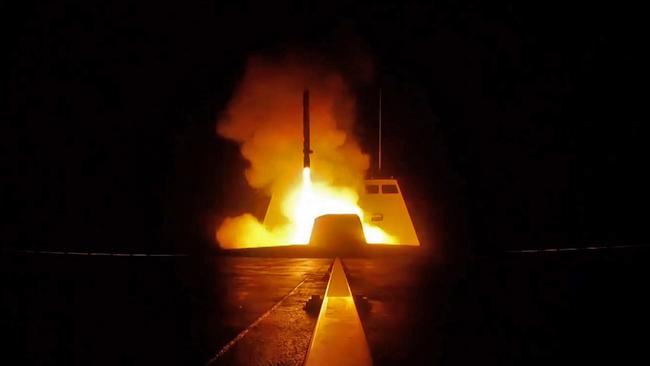
Mr Mattis acknowledges the US waged the attacks only with conclusive evidence that chlorine gas was used in the April 7 attack in Syria. Allegations of Mr Assad’s chlorine use are frequent in Syria’s conflict, raising questions about whether Washington had lowered the threshold for military action in Syria by now deciding to strike.
Last year, the US only waged strikes on Syria after determining that more deadly sarin gas was used. Some US media had reported that Washington was confident Mr Assad had also used sarin on April 7.
Mr Mattis, however, suggests the evidence of sarin is so far inconclusive. “We are very confident that chlorine was used. We are not ruling out sarin right now,” Mr Mattis says.
The Pentagon says one of the targets was a scientific research centre located in the greater Damascus area, which it says was involved in the development, production and testing of chemical and biological weaponry.
The second target was a chemical weapons storage facility west of the city of Homs.
“We assess that this was the primary location of Syrian sarin and precursor production equipment,” General Dunford says.
The third target, which was also near Homs, contained both a chemical weapons equipment storage facility and a command post.
1.20pm: Russia says strikes came amid chance of peace
Russia’s foreign ministry says Western strikes on Syria came as the country had “a chance of a peaceful future”.
Foreign ministry spokeswoman Maria Zakharova writes on Facebook: “Those behind all this claim moral leadership in the world and declare they are exceptional. You need to be really exceptional to shell Syria’s capital at the moment when it had gained a chance of a peaceful future.”
AFP
12.57pm: Explosions, smoke-filled sky in Damascus
Loud explosions rocked Syria’s capital and filled the sky with heavy smoke early on Saturday local time, reporters in the city say.
Associated Press reporters saw smoke rising from east Damascus and the lit-up sky turning orange during the blasts.
A huge fire could be seen from a distance to the east. Syrian television says the attacks targeted a scientific research centre in Barzeh, near Damascus, and an army depot near Homs. Syrian media reports that air defences hit 13 incoming rockets south of Damascus.
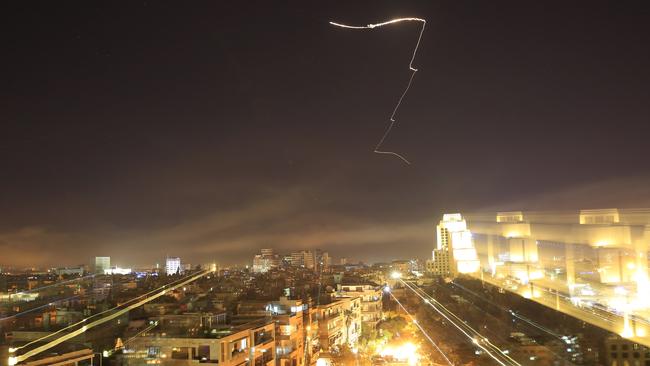
After the attack ceased and the early-morning skies went dark once more, vehicles with loudspeakers roamed the streets of Damascus blaring nationalist songs.
Syrian state TV calls the attacks a “blatant violation of international law and shows contempt for international legitimacy”.
AP
12.48pm: Russia warns of unspecified consequences
Syria ally Russia warns of “consequences” following the launch of US-led strikes against Bashar al-Assad’s government in retaliation for a suspected chemical attack.
“Again, we are being threatened,” Russia’s ambassador to the US, Anatoly Antonov, says in a statement.
“We warned that such actions will not be left without consequences. All responsibility for them rests with Washington, London and Paris,’’ Mfr Antonov says.
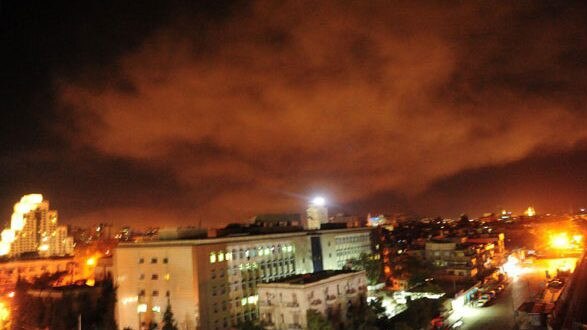
“Insulting the President of Russia is unacceptable and inadmissable,” adds the envoy, after President Donald Trump directly called out his Russian counterpart Vladimir Putin over his support for the Assad government.
Syria’s government says the joint attack is a “flagrant violation’’ that is “doomed to fail’’.
AFP
Cameron Stewart 12.45pm: Pentagon calls it a ‘one-time shot’, says US attacks over
US Defence Secretary James Mattis says the air strikes on targets in Syria were a “one-time shot” to send a strong message to the Syrian President.
General Joseph Dunford, chairman of the US Joint Chiefs of Staff, says he cannot confirm reports by Syrian media that some US missiles were shot down. He says there are no reports that Russian forces tried to shoot down US missiles.
Mr Mattis says the strikes were aimed at crippling Syria’s ability to produce chemical or biological weapons for years to come.
“We looked great for targets designed to specifically address the chemical weapons threat,” Mr Mattis says.
“It has sent a very strong message to dissuade him from doing it again.”
He describes the attacks as a “heavy strike” but says it was targeted only at Syria’s chemical weapons capabilities.
General Dunford said US missiles hit three targets in Syria including a scientific research facility near Damascus and a chemical weapons storage facility west of Homs. He says the attacks are now over.
General Dunford says Syria’s close ally Russia was not informed of the targets before the attack. But he says the attacks were carefully designed to minimise both civilian and foreign casualties.
Earlier report: Trump says US, allies attack Syria
US President Donald Trump and allies launched a major missile and air attack on multiple targets in Syria in response to the chemical weapons attack by Syrian dictator Bashar al-Assad that reportedly killed least 60 people.
The US President said late this morning AEST a combined military operation was under way with Britain and France. The operation was supported by the Australian Government. Full statements are at the end of this report.
“A short time ago, I ordered the United States armed forces to launch precision strikes on targets associated with the chemical weapons capabilities of Syrian dictator Bashar al-Assad,” Mr Trump said in a televised address from the White House.
Shortly before Mr Trump’s address, explosions were heard in the Barzeh district of the Syrian capital Damascus where a scientific research facility is located.
British Royal Air Force Tornado jets had fired Storm Shadow missiles at targets near the city of Homs, CNN reported. The British defence ministry said “initial indications” showed those air strikes had produced a “successful attack” on a Syrian military facility. “Initial indications are that the precision of the Storm Shadow weapons and meticulous target planning have resulted in a successful attack,” it said.
The US President said “the purpose of our action tonight is to establish a strong deterrent” against the production and use of chemical weapons, describing the issue as vital to US national security. Mr Trump said that the US was prepared “to sustain this response” until its aims were met.
“The evil and the despicable attack left mothers and fathers, infants and children, thrashing in pain and gasping for air. These are not the actions of a man. They are crimes of a monster instead,” he said.
#BREAKING: US President @realDonaldTrump has announced he has ordered armed forces to launch strikes on Syrian sites associated with chemical weapons, in conjunction with France and UK. He says strikes are now underway.
— Sky News Australia (@SkyNewsAust) April 14, 2018
MORE: https://t.co/3YStOZORY6 #SkyLiveNow pic.twitter.com/Lh01r5aICP
“The purpose of our actions tonight is to establish a strong deterrent against the production, spread, and use of chemical weapons,’’ the US leader said from the White House.
“Establishing this deterrent is a vital national security interest of the United States.
“The combined American, British, and French response to these atrocities will integrate all instruments of our national power — military, economic, and diplomatic. We are prepared to sustain this response until the Syrian regime stops its use of prohibited chemical agents.’’
The joint statement by Australian Prime Minister Malcolm Turnbull, Foreign Minister Julie Bishop and Defence Minister Marise Payne said the US, UK and France had “responded forcefully to the Syrian regime’s illegal use of chemical weapons’’ on April 7.
“Australia supports these strikes, which demonstrate a calibrated, proportionate and targeted response. They send an unequivocal message to the Assad regime and its backers, Russia and Iran, that the use of chemical weapons will not be tolerated,’’ they said.
Mr Trump also addressed Mr Assad’s allies: “To Iran, and to Russia, I ask: what kind of a nation wants to be associated with the mass murder of innocent men, women, and children?’’
The US strikes came after days of threats from the President that America would retaliate for what he described as ‘‘barbaric’’ attacks by Mr Assad on his own people.
It is the second time during Mr Trump’s presidency that he has ordered a missile attack against Syrian government forces in response to a chemical weapons attack by Mr Assad on Syrian civilians in rebel held areas.
Syria’s ally Russia had warned against the strikes, saying they risked a dangerous escalation of tensions between Washington and Moscow.
Mr Trump addressed his nation at 9pm Friday (11am AEST) on the situation in Syria, and confrimed the strikes were already under way.
Several huge explosions were heard in Syria’s capital Damascus early Saturday local time, AFP’s correspondent there said, as Mr Trump announced strikes on the country.
Syrian state television also reported the attack on Syria, in co-ordination with France and Britain. Syria said it had activated its air defences against ‘‘aggression’’.
“The purpose of our actions tonight is to establish a strong deterrent against the production, spread and use of chemical weapons,” Mr Trump said.
US President @realDonaldTrump on authorising airstrikes on Syria: The purpose of our actions tonight is to establish a strong deterrent against the production, spread and use of chemical weapons.
— Sky News Australia (@SkyNewsAust) April 14, 2018
MORE: https://t.co/3YStOZORY6 #SkyLiveNow pic.twitter.com/3BNvLNOjlC
British Prime Minister Theresa May also said she had authorised attacks. Ms May said the aim was to degrade Syria’s chemical weapons capability. “This is not about intervening in a civil war. It is not about regime change,” Ms May said in a statement.
“It is about a limited and targeted strike that does not further escalate tensions in the region and that does everything possible to prevent civilian casualties.”
Ms May said while the strike was targeted at Syria, it sent a message to anyone who used chemical weapons.
Britain has accused Russia of being behind a nerve agent attack on a former Russian spy in England last month, a charge Moscow has rejected. “This is the first time as prime minister that I have had to take the decision to commit our armed forces in combat — and it is not a decision I have taken lightly,” she said.
“I have done so because I judge this action to be in Britain’s national interest. We cannot allow the use of chemical weapons to become normalised — within Syria, on the streets of the UK, or anywhere else in our world.”

French President Emmanuel Macron said France had joined the US and Britain in an ongoing operation against Syria with strikes to target “the capacities of the Syrian regime to produce and use chemical weapons”.
“We cannot tolerate the normalisation of the use of chemical weapons,” he said in a statement.
Mr Trump said the strikes would aim to deter chemical weapons use by the Syrian government. after a “significant escalation in a pattern of chemical weapons use by that very terrible regime’’.
Monitors sad the Western strikes hit Syria bases and chemical research centres around Damascus.

Mr Trump had spent the past few days huddling with his senior military advisers, and speaking to allies France and Britain, in deciding what action to take after the deadly attack in Douma, the largest town in the former rebel-held bastion of Eastern Ghouta.
The State Department said this morning that the US had proof that Syrian leader Assad’s government launched the chemical weapons strike last weekend on the then rebel-held city of Douma.
“I’m not going to say which day we absolutely knew that there was proof. The attack took place [last] Saturday, we know for a fact that it was a chemical weapon,” spokeswoman Heather Nauert said on Friday US time.
“We know that there are only certain countries like Syria that have delivery mechanisms and have those types of weapons.”
Asked whether she could say that the US has proof that Mr Assad’s regime was behind the strike, Ms Nauert said: “Yes.”
International experts from the Organisation for the Prohibition of Chemical Weapons were due in Syria over the weekend to inspect the site where dozens of civilians reportedly died in a gas attack.
But the OPCW is not mandated to ascribe blame to any party, simply to establish facts like the kind of agent that was used, how it was delivered and how many people it killed or wounded.
Ms Nauert said that the US administration was not relying on the OPCW findings but had sources of its own.
She acknowledged that some commentators have asked why the US has not make its “intelligence information” public if it has any, but said “a lot of this stuff is classified right now”.
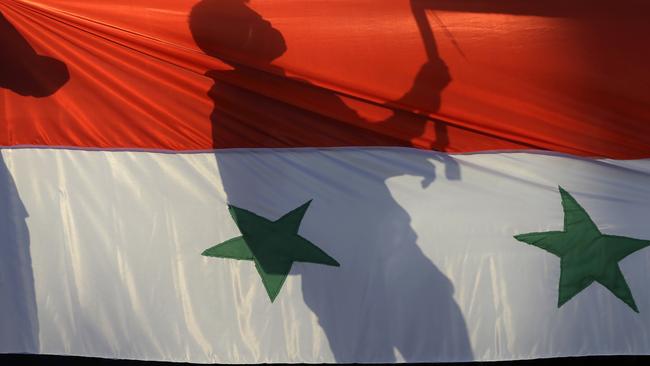
Western powers said on Friday an alleged Syrian chemical massacre must not go unanswered even as the UN secretary-general warned against a “full-blown military escalation”.
Russia warned the West not to make any “dangerous” moves against its ally, the Assad government, and claimed to have proof that the attack had been staged by rescue workers acting on Britain’s behalf.
With the British government now estimating that the death toll from the attack has risen to 75, Mr Trump and British and French leaders are contemplating punitive military action.
Mr Trump’s spokeswoman Sarah Sanders said Washington also held Mr Assad’s ally “Russia responsible for their failure to stop chemical weapons attacks from taking place”.
Mr Trump’s National Security Council was to meet later Friday at the level of agency deputy heads, she said.
Any intervention increases the risk of a clash with Russian forces in Syria to defend Mr Assad, and UN chief Antonio Guterres told the Security Council to beware a “full-blown military escalation”.
But France’s UN ambassador Francois Delattre told the council that in choosing once again to use banned chemical weapons against civilians, Mr Assad’s regime had “reached a point of no return”.
US UN ambassador Nikki Haley, while allowing that Washington was still weighing its options and pursuing its own investigation, told her colleagues, “At one point, you have to do something.”
“All nations and all people will be harmed if we allow Assad to normalise the use of chemical weapons,” she said.
Russia, in addition to its unproven allegations against Britain, alleged the West was feigning outrage over the attack as a cover for a plan to overthrow Mr Assad’s government.
“We continue to observe dangerous military preparations for an illegal act of force against a sovereign state,” Russian ambassador Vassily Nebenzia told the Security Council.
Tension between Russia and the West came amid signs the parallel conflict between Israel and Iran’s forces and proxies in Syria is also on the point of escalation.
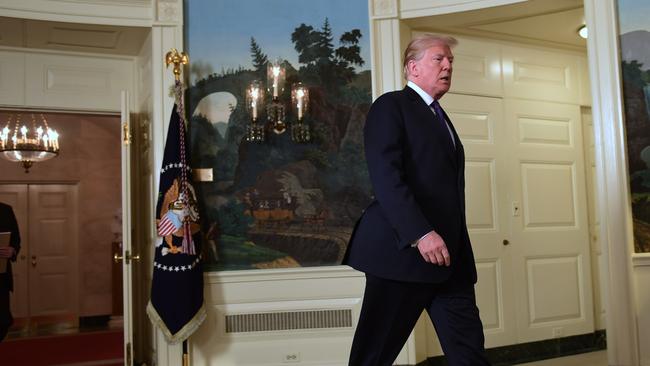
Earlier this week, Israel bombed a Syrian air base used by Mr Assad’s regional allies, killing at least seven Iranians, and prompting threats from Tehran and its Lebanese militia ally Hezbollah.
“The Israelis carried out a historic mistake … and put themselves in direct combat with Iran,” Hezbollah leader Hassan Nasrallah warned on Friday in a televised address.
But the growing fears of escalation appear to have given Western leaders food for thought.
After warning in a belligerent tweet earlier this week that “missiles are coming,” Mr Trump backed off from talk of imminent action and met with commanders to look at options.
France’s President Macron, meanwhile, on Friday called for stepped-up talks with Moscow and spoke to President Putin by phone.
“The most important thing is to refrain from ill-considered and dangerous actions that would constitute a gross violation of the UN Charter and would have unpredictable consequences,” the Kremlin said.
Western officials believe chlorine was used in the April 7 attack on Douma, the main city in the former rebel bastion of Eastern Ghouta.
What is less clear is whether sarin, the agent used in a chemical attack that prompted US missile strikes last year, was also used.
Russia, which has stonewalled diplomatic efforts at the UN Security Council, has vehemently denied a chemical attack took place.
OPCW inspectors are still expected to arrive in Syria at the weekend to investigate, following an invitation from Damascus.
Diplomats have expressed concern that the experts could be used as hostages or human shields.
Since last weekend, when images of ashen toddlers struggling for breath emerged, there has been a sustained military build-up in the eastern Mediterranean.
A French frigate, British Royal Navy submarines and the USS Donald Cook, an American destroyer equipped with Tomahawk land attack missiles, all moved into range of Syria’s coast.
On the ground, rebels and civilians were evacuating from Douma on Friday after anti-regime fighters in Eastern Ghouta surrendered their heavy weapons and their leader left the enclave.
This signalled the end of one of the bloodiest assaults of the seven-year war and a major win for the Assad regime.
Cameron Stewart is also US Contributor for Sky News Australia
with agencies
THE WHITE HOUSE
Office of the Press Secretary
April 13, 2018
STATEMENT BY PRESIDENT TRUMP ON SYRIA
Diplomatic Room
9:01 P.M. EDT
THE PRESIDENT: My fellow Americans, a short time ago, I ordered the United States Armed Forces to launch precision strikes on targets associated with the chemical weapons capabilities of Syrian dictator Bashar al-Assad. A combined operation with the armed forces of France and the United Kingdom is now underway. We thank them both.
Tonight, I want to speak with you about why we have taken this action.
One year ago, Assad launched a savage chemical weapons attack against his own innocent people. The United States responded with 58 missile strikes that destroyed 20 per cent of the Syrian Air Force.
Last Saturday, the Assad regime again deployed chemical weapons to slaughter innocent civilians — this time, in the town of Douma, near the Syrian capital of Damascus. This massacre was a significant escalation in a pattern of chemical weapons use by that very terrible regime.
The evil and the despicable attack left mothers and fathers, infants and children, thrashing in pain and gasping for air. These are not the actions of a man; they are crimes of a monster instead.
Following the horrors of World War I a century ago, civilised nations joined together to ban chemical warfare. Chemical weapons are uniquely dangerous not only because they inflict gruesome suffering, but because even small amounts can unleash widespread devastation.
The purpose of our actions tonight is to establish a strong deterrent against the production, spread, and use of chemical weapons. Establishing this deterrent is a vital national security interest of the United States. The combined American, British, and French response to these atrocities will integrate all instruments of our national power — military, economic, and diplomatic. We are prepared to sustain this response until the Syrian regime stops its use of prohibited chemical agents.
I also have a message tonight for the two governments most responsible for supporting, equipping, and financing the criminal Assad regime.
To Iran, and to Russia, I ask: What kind of a nation wants to be associated with the mass murder of innocent men, women, and children?
The nations of the world can be judged by the friends they keep. No nation can succeed in the long run by promoting rogue states, brutal tyrants, and murderous dictators.
In 2013, President Putin and his government promised the world that they would guarantee the elimination of Syria’s chemical weapons. Assad’s recent attack — and today’s response — are the direct result of Russia’s failure to keep that promise.
Russia must decide if it will continue down this dark path, or if it will join with civilised nations as a force for stability and peace. Hopefully, someway we’ll get along with Russia, and maybe even Iran — but maybe not.
I will say this: The United States has a lot to offer, with the greatest and most powerful economy in the history of the world.
In Syria, the United States — with but a small force being used to eliminate what is left of ISIS — is doing what is necessary to protect the American people. Over the last year, nearly 100 per cent of the territory once controlled by the so-called ISIS caliphate in Syria and Iraq has been liberated and eliminated.
The United States has also rebuilt our friendships across the Middle East. We have asked our partners to take greater responsibility for securing their home region, including contributing large amounts of money for the resources, equipment, and all of the anti-ISIS effort. Increased engagement from our friends, including Saudi Arabia, the United Arab Emirates, Qatar, Egypt, and others can ensure that Iran does not profit from the eradication of ISIS.
America does not seek an indefinite presence in Syria under no circumstances. As other nations step up their contributions, we look forward to the day when we can bring our warriors home. And great warriors they are.
Looking around our very troubled world, Americans have no illusions. We cannot purge the world of evil, or act everywhere there is tyranny.
No amount of American blood or treasure can produce lasting peace and security in the Middle East. It’s a troubled place. We will try to make it better, but it is a troubled place. The United States will be a partner and a friend, but the fate of the region lies in the hands of its own people.
In the last century, we looked straight into the darkest places of the human soul. We saw the anguish that can be unleashed and the evil that can take hold. By the end of the World War I, more than one million people had been killed or injured by chemical weapons. We never want to see that ghastly spectre return.
So today, the nations of Britain, France, and the United States of America have marshaled their righteous power against barbarism and brutality.
Tonight, I ask all Americans to say a prayer for our noble warriors and our allies as they carry out their missions.
We pray that God will bring comfort to those suffering in Syria. We pray that God will guide the whole region toward a future of dignity and of peace.
And we pray that God will continue to watch over and bless the United States of America.
Thank you, and goodnight. Thank you.
AUSTRALIAN GOVERNMENT STATEMENT
April 14, 2018
Response to targeted strikes in Syria
From Prime Minister Malcolm Turnbull, Foreign Minister Julie Bishop and Defence Minister Marise Payne
Today, the United States, United Kingdom and France responded forcefully to the Syrian regime’s illegal use of chemical weapons on 7 April in Douma.
Australia supports these strikes, which demonstrate a calibrated, proportionate and targeted response. They send an unequivocal message to the Assad regime and its backers, Russia and Iran, that the use of chemical weapons will not be tolerated.
The use of chemical weapons by anyone, anywhere, under any circumstances is illegal and utterly reprehensible. The Assad regime must not be allowed to commit such crimes with impunity.
Australia called on the United Nations Security Council (UNSC) to address this chemical attack as soon as possible. In UNSC debate over a resolution to create an independent investigative mechanism to examine chemical weapons use in Syria on 10 April, Russia used its veto power to shield the Assad regime from the consequences of its abhorrent actions. By doing so, Russia showed yet again a blatant disregard for the application of international law and norms against the use of chemical weapons.
Russia must fulfil its responsibilities as a permanent member of the Security Council and not obstruct UNSC responses to the use of chemical weapons in Syria.
The Australian Government has taken action in response to the Syrian regime’s use of chemical weapons. It has placed a total of 135 individuals and 42 entities under Australia’s autonomous sanctions regime in relation to Syria including the 24 August 2017 sanctions against 40 individuals and 14 entities linked to the Syrian regime’s chemical weapons program
Australia has long called for a political solution to this crisis and continues to support the UN-led peace process in Geneva. Since 2011, we have committed and provided more than $433 million in humanitarian assistance to support those affected by the civil war in Syria.
Russia and Syria’s other main supporter, Iran, must place pressure on the regime to end its abuse of international law and human rights within the conflict and engage seriously in negotiations to bring the seven year civil war to an end.








To join the conversation, please log in. Don't have an account? Register
Join the conversation, you are commenting as Logout